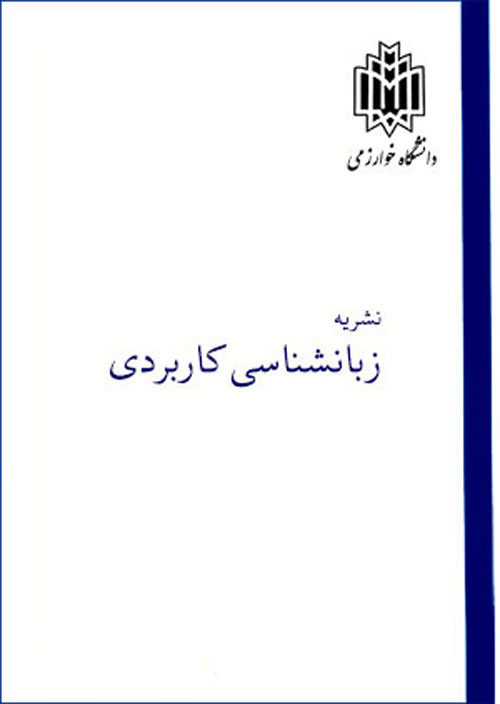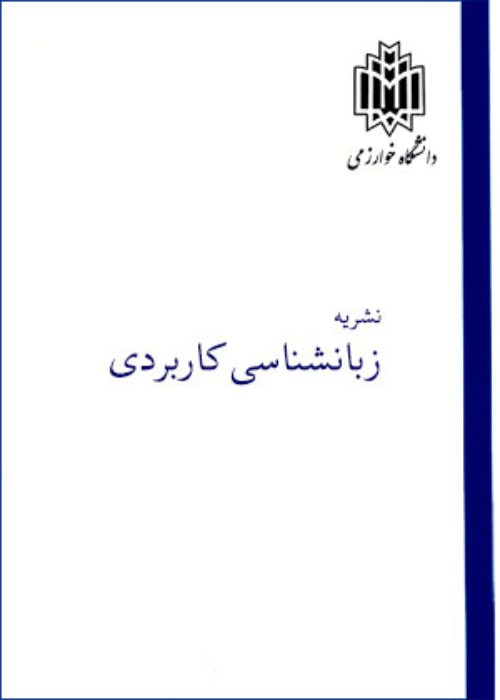فهرست مطالب

Iranian Journal of Applied Linguistics
Volume:22 Issue: 1, Mar 2019
- تاریخ انتشار: 1399/11/03
- تعداد عناوین: 6
-
-
Pages 1-26
The present study aimed to examine the translatorchr('39')s solutions to the translation of conversational implicatures from English into Persian. To do so, 120 conversational implicatures were extracted from the novel the Lord of the Rings (Tolkien, 1954) and classified based on Gricechr('39')s (1975) categorization of Maxims, including quality, quantity, relevance, and manner. Mur Duenaschr('39')s (2003) taxonomy of translation strategies was used as a valid framework to find out the translation strategies the translator employed to transfer the 120 conversational implicatures. Furthermore, the most /least frequent translation strategies applied by the translator were investigated. At the end, the effectiveness of the source text (ST)-and target text (TT)-oriented strategies in transferring the same meaning of implicatures to the target text was determined. As the results indicate, the translator employed five out of six of Mur Duenaschr('39')s translation strategies, namely TL cultural cognate, SL cultural and linguistic borrowing, replacement of the SL cultural reference by explanation, TL cultural reference suppression, and TL cultural reference literal translation, of which SL cultural and linguistic borrowing and replacement of the SL cultural reference by explanation were the most/least frequently-used strategies. Moreover, the translator preferred to employ the ST-oriented strategies rather than the TT-oriented ones that referred to the employment of the ST-oriented strategy for the whole text. Based on Gricechr('39')s theory, the researcher concluded that the ST-oriented strategies were more effective than the TT-oriented ones and helped the translator to produce comprehensible translations and convey the meaning of implicatures to the target readers
Keywords: Pragmatics, conversational implicature, Grice's maxims -
Pages 27-72
Knowledge representation, defined as the way individuals structure their knowledge and cognitive processing of events and the associated sense-making processes, is believed to influence teachers’ reasoning/thinking skills. While extensively researched in mainstream teacher education, this line of inquiry is essentially lacking in the L2 teacher education literature. To fill some of the void, the present study explored 36 – 18 novice and 18 experienced – EFL teachers’ representations of classroom management events. The teachers were presented with 8 fragments involving management problems in a novice teacher’s performance and were asked to provide their representations of the scenes. To explore likely differences between the two groups’ representations, the Mann-Whitney U test was used. Data analyses indicated that experienced teachers provided a significantly higher number of representations across majority of the categories of the coding scheme, except for disciplinary issues which were of prime concern to novice teachers. The implications of the study for pre-service and in-service teacher education are discussed.
Keywords: knowledge representation, classroom management, novice teachers, experienced teachers, expertise -
Pages 73-115
The purpose of the study was to investigate the effect of mediation on the development of a novice teacher and in turn the effect of transformation of the teacher on the behaviors and emotions of the learners using Vygotskian sociocultural view of learning. For this purpose, a novice teacher teaching the general English course at an Iranian university was selected. To develop an understanding of the instructional setting and to diagnose her weaknesses and strengths, she was observed by a teacher educator during the first five sessions. Different instruments and tools like the teacher and students’ narratives, stimulated recall of voice-recorded actual teaching, and observation were also used during the study to trace the teacher’s cognitive and emotional development. As most of her practices displayed over-reliance on translation and deductive teaching of grammar, and her oral narration showed instances of cognitive/emotional dissonance, strategic mediations, both implicit and explicit, based on her needs were offered after the fifth session in a face-to-face interaction to help her develop gradually. Analysis of the results showed the gradual development of her and the positive attitudes and active engagement of the learners during she was being mediated. Implications of the findings are presented and discussed.
Keywords: Sociocultural theory, teacher education, mediation, novice teacher learning, teacher emotion -
Pages 116-153
Research on the effect of implicit and explicit instruction on developing learners’ explicit knowledge by the use of measures of explicit knowledge abounds in the literature. However, measuring learners’ implicit knowledge employing fine-grained measures has rarely been the concern of researchers in the field. Therefore, the present study is an attempt to scrutinize the effectiveness of implicit and explicit instruction through administering a Word Monitoring Task (WMT), as a more valid psycholinguistic measure of implicit knowledge. The necessary data were collected from 47 pre-intermediate participants in three different groups, i.e., (1) the implicit group received textually enhanced texts of verb complementation, (2) the explicit group was presented with metalinguistic explanations and examples of the target feature, and (3) the control group was deprived of any instruction. The results of the mixed between-within subjects ANOVA revealed that although both implicit and explicit instructions facilitated the development of the implicit knowledge of the target feature, the learners in the explicit group outperformed their counterparts in the implicit and the control groups in both the immediate and delayed post-tests. Moreover, the results indicated more durable effects of implicit instruction compared with those of explicit instruction. Overall, the findings provided evidence for the superiority of explicit instruction and the long-term effect of implicit instruction in developing relevant knowledge of verb complementation. The findings of the study can benefit both teachers and learners in developing teaching/learning strategies to improve and facilitate the grasp of both explicit and implicit knowledge.
Keywords: Implicit instruction, explicit instruction, implicit knowledge, word monitoring task -
Pages 154-196
In the area of teaching translation, investigating the effectiveness of technological solutions in developing translation skills is both timely and in demand. As the first step, one can try to explore feedback generated by machines compared to humans. The purpose of this study was to examine the impact of electronic feedback provided by the designed translation software on the translation skills of Iranian EFL students compared to the feedback given by an expert human observer. To this end, 60 intermediate male and female students were selected as participants after the administration of Oxford Placement Test (OPT), followed by a translation skill test as pretest and posttest. The analysis of the pretest and posttest data revealed that after receiving the two types of feedback, both groups performed significantly better on posttest. Further analysis of the data, however, indicated that sustained electronic observer feedback was superior to human observer feedback in terms of developing translation skills. It can be discussed that taking advantage of an efficient electronic tool which enjoys the potential of providing some feedback would drive the focus away from the repetitive mistakes and frees up the time and focus on students’ personal problems. The findings may have implications for translation education, training, and practice.
Keywords: Electronic observer feedback, human observer feedback, translation skills, translation software -
Pages 197-241
Procrastination pervades the long and taxing process of foreign language learning and working against it is crucial. This study attempted to elicit and investigate the strategies and solutions from English teachers and learners which can help in dealing with procrastination over weekly assignments, term projects, and preparing for exams. To achieve this aim, suggestions were sought from 46 English teachers who had at least three years of teaching experience. Out of a total of 384 suggestions, higher-frequency ones were listed and solutions and strategies in related literature were sifted through to draw up a 21-item Likert-type questionnaire, which sought the reaction of English learners to the teacher-suggested strategies. A revised version was distributed among 97 English learners comprising 65 females and 32 males, whose ages ranged from 17 to 29 years. The English language teachers believed that to help students abandon their procrastination, they should encourage them with extra points for duly completed assignments, check the progress of projects, and give quizzes and exams during the term atop of other strategies. The most frequently endorsed strategies by the English learners included: adjusting the quantity of assignments to learner’s ability, selecting attractive and diverse assignments, teacher’s proper guidance and providing sample projects to reduce anxiety; and identifying the most important topics and disregarding unnecessary contents.
Keywords: Academic procrastination, anti-procrastination strategies, learners’ views, Teachers’ views


